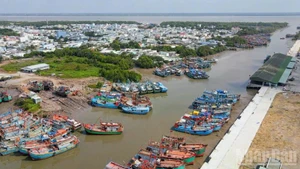The Ministry of Agriculture and Rural Development held a forum in Ho Chi Minh City on November 21 to discuss the development of organic agriculture according to value chains.
Vietnam had about 174,000ha of organic farming land in 2020, an increase of 47% compared to 2016.
Most localities across the country have participated in organic agricultural production or are converting to organic farming, with the participation of more and more individuals and organisations.
The whole country has seen many groups of organic products certified according to production value chains in the fields of cultivation, husbandry, fisheries and forestry. There are more than 17,000 organic agricultural production establishments, about 550 organic agriculture processors, 60 exporters and 40 importers in the field.
According to the Department of Agricultural Product Processing and Market Development under the Ministry of Agriculture and Rural Development, the total annual domestic consumption of organic agricultural products is about 500 billion VND, with 80% of the consumption recorded in Hanoi and Ho Chi Minh City.
The export turnover of Vietnamese organic agricultural products has reached over 335 million USD per year to 180 markets around the world. The organic products shipped being abroad include tea, shrimp, rice, cashew nuts, pepper, cinnamon, anise, essential oils, spices, and others.
At the forum, experts said that the organic agricultural product market will continue to grow strongly as the demand for organic food is tending to increase.
However, the development of organic agriculture in Vietnam has not really seen significant results as there are still many barriers in awareness. Furthermore, production costs and input materials for organic agricultural production remain high while human resources and technology application are limited.
Vietnam also faces two major challenges in the process of brand building and developing sustainable organic agriculture, namely food safety and hygiene and climate change.
















